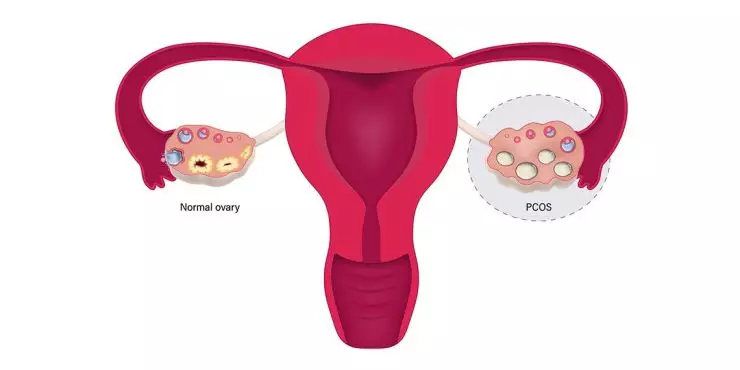
Polycystic ovary syndrome, commonly known as PCOS, is a health condition that affects millions of women worldwide. It is estimated that between 5% to 10% of women worldwide have PCOS. In the United States, approximately 1 in 10 women of childbearing age is affected by the condition. This makes PCOS a significant health concern, given its potential impact on fertility, metabolic health, and overall well-being.
Understanding the signs, getting a proper diagnosis, and exploring the available treatment options are key steps in managing PCOS effectively.
What is Polycystic Ovary Syndrome (PCOS)?
PCOS is a hormonal disorder characterized by the presence of multiple small cysts on the ovaries, although not all women with PCOS have cysts. The condition is marked by an imbalance of reproductive hormones, which can lead to a range of symptoms, including irregular menstrual cycles, excess androgen levels (male hormones), and insulin resistance. The exact cause of PCOS is not fully understood, but it is believed to involve a combination of genetic and environmental factors.
Recognizing the Signs and Symptoms of PCOS
The symptoms of PCOS can vary widely from one woman to another, and they may start as early as adolescence or develop later in life. Recognizing the signs is crucial for early diagnosis and management. Some of the most common symptoms include:
- Irregular Periods: Women with PCOS often experience irregular menstrual cycles, which can include infrequent periods, prolonged periods, or even no periods at all. This is one of the most common signs and often prompts women to seek medical advice.
- Excess Androgen Levels: Elevated levels of androgens (male hormones) can lead to physical symptoms such as hirsutism (excessive hair growth on the face, chest, and back), acne, and male-pattern baldness.
- Weight Gain and Difficulty Losing Weight: Many women with PCOS struggle with weight gain, particularly around the abdomen, and may find it challenging to lose weight despite efforts to do so.
- Ovarian Cysts: The term "polycystic" refers to the presence of multiple small cysts on the ovaries. However, not all women with PCOS have visible cysts, and having cysts does not necessarily mean a woman has PCOS.
- Insulin Resistance: Insulin resistance, where the body’s cells do not respond effectively to insulin, is a common feature of PCOS. This can lead to higher insulin levels, weight gain, and an increased risk of developing type 2 diabetes.
- Infertility: PCOS is one of the leading causes of infertility due to irregular ovulation or lack of ovulation. However, many women with PCOS can still conceive with the right treatment and management.
- Mood Changes: Women with PCOS are at a higher risk for mood disorders such as depression and anxiety, likely due to the hormonal imbalances and the physical symptoms associated with the condition.
Diagnosing PCOS
Diagnosing PCOS involves a combination of medical history, physical examination, blood tests, and imaging studies. There is no single test to diagnose PCOS; rather, the diagnosis is made based on a combination of criteria:
- Medical History: The doctor will ask about the patient's menstrual history, any changes in weight, hair growth patterns, and other symptoms that might indicate hormonal imbalances.
- Physical Examination: This may include a pelvic exam to check for any abnormalities in the reproductive organs.
- Blood Tests: Blood tests are used to measure hormone levels, including androgen levels, and to assess blood sugar and insulin levels. Thyroid function and other hormone-related conditions may also be evaluated.
- Ultrasound: An ultrasound of the ovaries may be performed to check for the presence of cysts and to assess the overall health of the ovaries.
According to the Rotterdam criteria, a woman is diagnosed with PCOS if she has at least two of the following three features: irregular or absent periods, excess androgen levels, and polycystic ovaries on ultrasound.

Treating PCOS: A Multifaceted Approach
While there is no cure for PCOS, it can be effectively managed with a combination of lifestyle changes, medications, and in some cases, surgery. The treatment plan is often tailored to the individual's symptoms, goals (such as managing symptoms, improving fertility, or reducing the risk of long-term complications), and overall health.
Lifestyle Modifications
- Diet and Exercise: A healthy diet and regular physical activity are fundamental in managing PCOS, particularly for weight management and improving insulin sensitivity. A diet rich in whole grains, lean proteins, healthy fats, and plenty of fruits and vegetables can help regulate blood sugar levels and support weight loss. Learn more about the Mediterranean diet, sometimes referred to as the “one-size fits all” diet.
- Weight Management: Even a modest reduction in weight can significantly improve symptoms such as menstrual regularity and insulin resistance. Weight loss can also enhance the effectiveness of medications used to treat PCOS.
Medications
- Oral Contraceptives: Birth control pills are often prescribed to regulate menstrual cycles, reduce androgen levels, and manage symptoms like acne and hirsutism.
- Metformin: This medication, commonly used to treat type 2 diabetes, can improve insulin sensitivity and help with weight management and menstrual regulation in women with PCOS.
- Anti-Androgens: Medications such as spironolactone can be used to reduce androgen levels and manage symptoms like excessive hair growth and acne.
- Fertility Treatments: For women trying to conceive, medications such as clomiphene or letrozole may be used to induce ovulation. In some cases, assisted reproductive technologies like in vitro fertilization (IVF) may be considered.
Surgical Options
- Ovarian Drilling: This is a laparoscopic surgical procedure used in some cases to trigger ovulation by destroying a small portion of the ovarian tissue that produces androgens. It is generally considered when other treatments have not been successful.
- Bariatric Surgery: For women with severe obesity and PCOS, bariatric surgery may be considered to promote weight loss and improve metabolic health, which can, in turn, improve PCOS symptoms.
Natural and Alternative Therapies
- Supplements: Some women with PCOS find relief through supplements such as inositol, omega-3 fatty acids, and vitamin D, which may help improve insulin sensitivity and hormonal balance.
- Acupuncture: Acupuncture has been explored as a complementary treatment for PCOS, particularly for improving menstrual regularity and reducing stress. While more research is needed, some women find it beneficial.
- Stress Management: Chronic stress can exacerbate hormonal imbalances, so incorporating stress-reduction techniques such as yoga, meditation, and mindfulness can be helpful in managing PCOS.
Long-Term Management and Complications
Managing PCOS is a long-term commitment, and it is important to regularly monitor symptoms and adjust treatment plans as needed. Women with PCOS are at increased risk for several long-term health issues, including type 2 diabetes, cardiovascular disease, and endometrial cancer. Regular check-ups with a healthcare provider, along with lifestyle management, are essential for reducing these risks.
Schedule Your Regular Check Up Today
Polycystic ovary syndrome is a complex and often frustrating condition, but with the right approach, it is manageable. Recognizing the signs and seeking a timely diagnosis are the first steps toward taking control of the condition. By working closely with a healthcare provider to develop a personalized treatment plan, women with PCOS can effectively manage their symptoms, improve their quality of life, and reduce the risk of long-term health complications. Whether through lifestyle changes, medication, or other therapies, there are many paths to living well with PCOS.
Remember, your regular checkups are critical for early detection of PCOS and many other illnesses when they are most treatable. Book your visit today.